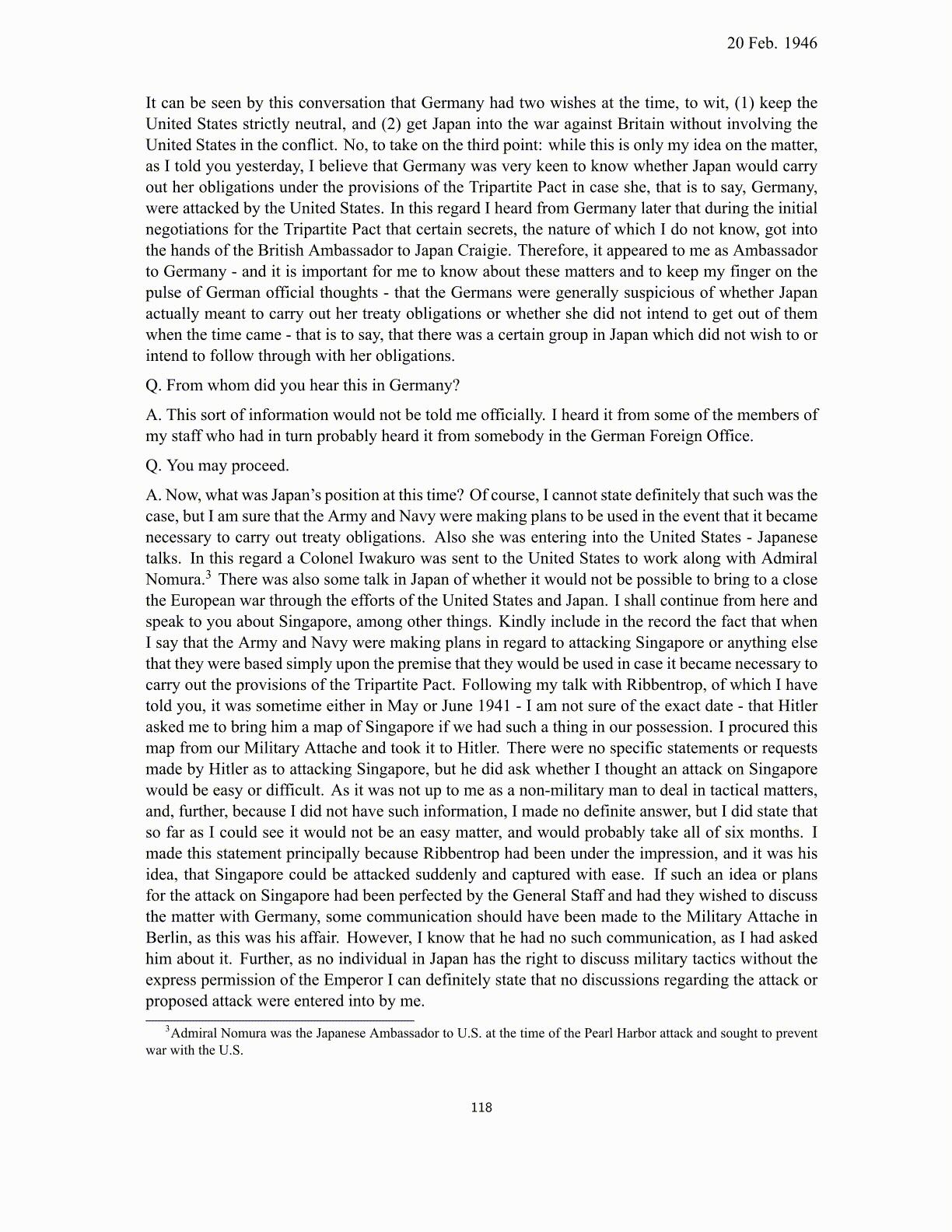
20 Feb. 1946 It can be seen by this conversation that Germany had two wishes at the time, to wit, (1) keep the United States strictly neutral, and (2) get Japan into the war against Britain without involving the United States in the conflict. No, to take on the third point: while this is only my idea on the matter, as I told you yesterday, I believe that Germany was very keen to know whether Japan would carry out her obligations under the provisions of the Tripartite Pact in case she, that is to say, Germany, were attacked by the United States. In this regard I heard from Germany later that during the initial negotiations for the Tripartite Pact that certain secrets, the nature of which I do not know, got into the hands of the British Ambassador to Japan Craigie. Therefore, it appeared to me as Ambassador to Germany - and it is important for me to know about these matters and to keep my finger on the pulse of German official thoughts - that the Germans were generally suspicious of whether Japan actually meant to carry out her treaty obligations or whether she did not intend to get out of them when the time came - that is to say, that there was a certain group in Japan which did not wish to or intend to follow through with her obligations. Q. From whom did you hear this in Germany? A. This sort of information would not be told me officially. I heard it from some of the members of my staff who had in turn probably heard it from somebody in the German Foreign Office. Q. You may proceed. A. Now, what was Japan’s position at this time? Of course, I cannot state definitely that such was the case, but I am sure that the Army and Navy were making plans to be used in the event that it became necessary to carry out treaty obligations. Also she was entering into the United States - Japanese talks. In this regard a Colonel Iwakuro was sent to the United States to work along with Admiral Nomura. 3 There was also some talk in Japan of whether it would not be possible to bring to a close the European war through the efforts of the United States and Japan. I shall continue from here and speak to you about Singapore, among other things. Kindly include in the record the fact that when I say that the Army and Navy were making plans in regard to attacking Singapore or anything else that they were based simply upon the premise that they would be used in case it became necessary to carry out the provisions of the Tripartite Pact. Following my talk with Ribbentrop, of which I have told you, it was sometime either in May or June 1941 - I am not sure of the exact date - that Hitler asked me to bring him a map of Singapore if we had such a thing in our possession. I procured this map from our Military Attache and took it to Hitler. There were no specific statements or requests made by Hitler as to attacking Singapore, but he did ask whether I thought an attack on Singapore would be easy or difficult. As it was not up to me as a non-military man to deal in tactical matters, and, further, because I did not have such information, I made no definite answer, but I did state that so far as I could see it would not be an easy matter, and would probably take all of six months. I made this statement principally because Ribbentrop had been under the impression, and it was his idea, that Singapore could be attacked suddenly and captured with ease. If such an idea or plans for the attack on Singapore had been perfected by the General Staff and had they wished to discuss the matter with Germany, some communication should have been made to the Military Attache in Berlin, as this was his affair. However, I know that he had no such communication, as I had asked him about it. Further, as no individual in Japan has the right to discuss military tactics without the express permission of the Emperor I can definitely state that no discussions regarding the attack or proposed attack were entered into by me. 3 Admiral Nomura was the Japanese Ambassador to U.S. at the time of the Pearl Harbor attack and sought to prevent war with the U.S. 118